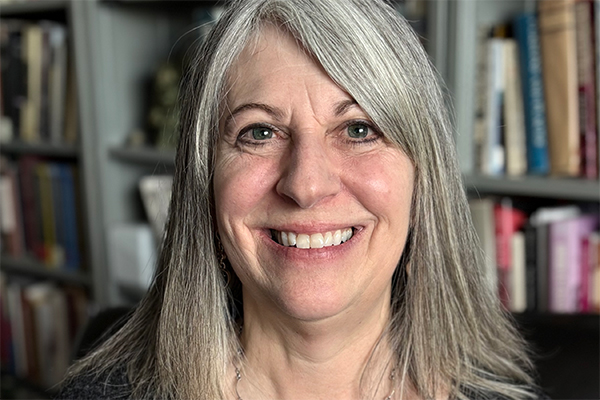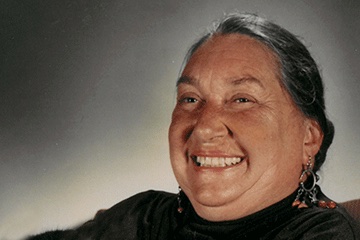
05/19/2025
Groundbreaking historian Laura Gathagan was recently recognized as the 2025 recipient of SUNY Cortland’s Rozanne M. Brooks Dedicated Teacher Award for giving her students a genuine taste of what it means to be a contemporary historian.
“Laura’s teaching is inspired. She is truly a role model to educators working to create a positive learning culture for their students,” said past-recipient Kathleen Lawrence, a SUNY Cortland professor of communication and media studies and the Brooks Award committee chair.
Gathagan doesn’t simply lecture on historical facts. She engages them in ‘historiography,’ the exploration of how history was written and what factors influenced the people who wrote it.
“Historiography is a fancy word for different historians having a conversation and a debate on a particular topic,” Gathagan said. “When I use historiography in my classes, I’m trying to show my students that history isn’t just a set of dates and names.
“History is a world in which we uncover new knowledge and debate it; we have a conversation about it in print. That’s why we publish. That’s why we attend professional conferences.”
Her students do those very things. Three — Chelsea Lachman ’13, Jesse Goon ’19 and Brianna Gambichler ’24 — are credited in Gathagan’s 2025 book, The Queenship of Mathilda of Flanders, c. 1031-1083: Embodying Conquest (Boydell Press). Lachman and Goon helped in Gathagan’s investigations full-time, supported by SUNY Cortland Undergraduate Research Summer Fellowship awards.
Typically, her future historians arrive in class ready to share their thoughts on the latest published findings they were assigned to read, according to Gathagan. These may include articles that Gathagan herself has researched abroad and written on the surprisingly strong influence of medieval European women in monastic and royal life.
“She has a magical power to turn reluctant and lost students into avid followers in a matter of a few short weeks with her excitement and passion,” said former student Megan Hutchins ’13, currently the engagement and collections manager at the State of Delaware Division of Historical and Cultural Affairs.
"I left every class yearning to dive deeper into the subject matter and found myself enthralled by the world of Mathilda of Flanders, despite not having an interest in medieval history prior to taking her class,” said another former student, Tony Thompson ’24, who teaches eighth grade social studies and 12th grade economics in the Watkins Glen (N.Y.) Central School District.
A committee of past Brooks Award winners reviewed testimonials about Gathagan before naming her as the 18th faculty member to receive the prestigious teaching accolade, which comes with a $7,500 honorarium to enhance the recipient’s teaching initiatives. Gathagan was formally recognized with other university honorees at a pre-2025 Commencement dinner on May 15.
Over two semesters, the committee evaluated Gathagan’s interactions with students, her unique and creative teaching approaches, her dedication to reaching out to students beyond the classroom and her overall ability to engage them in spirited, exciting and memorable learning experiences.
Committee member Lin Lin, a professor of childhood/early childhood education and past Brooks Award recipient, noted in classroom observation how Gathagan’s students worked collaboratively in small teams to turn in one handout at the end of a session, taking turns on notetaking and with everyone participating in discussion equally.
“She encouraged students to ask questions that trace how analysis of each source follows,” Lin said, describing Gathagan’s practice of analyzing different sources and explaining to the class how the time of the published source impacts the analysis. “For example, a source published in the ’70s, or a source published in the ’80s or 2025 might hold a clue to the way the topic is explored in time.”
Gathagan’s assigned readings are chosen with great forethought. Aware that the articles can be very hard for non-historians to grasp, she’s not grading on reading comprehension.
“The content of my courses is grounded in unfamiliar times and places,” Gathagan said. “Even the geography of what I teach is a mystery to most of my students. Thus, much of my class is spent familiarizing them with the medieval world and helping them to absorb and eventually analyze it.”
Therefore, she makes strategic and sparing use of “high stakes” graded, evaluative measures. Instead, collaborative learning shapes her students’ thinking.
“It gives my students a picture of the current debate in a particular field,” Gathagan said. “That field could be medieval arms and armor, or medieval women’s power in an abbatial or monastic context, or women’s power in military endeavors. … This shows them how historians are discussing sources, what arguments they are bringing to bear, when they are looking at these topics.”
The Brooks Award was endowed through the generosity of the late Rozanne Marie Brooks, a SUNY Distinguished Teaching Professor and SUNY Cortland professor emerita of sociology and anthropology, and her former students, friends and colleagues. A SUNY Cortland faculty member for 36 years, Brooks died in 1997. The first award was presented in spring 1998, with 17 more honorees since then.

Gathagan will use her Brooks Award stipend to pursue the scholarship at the heart of her transformational teaching. The money will offset the cost for her to visit European archives containing rare and very closely held primary documents. There, she can see, read, transcribe, and translate from French or Latin, these original documents. The money also will enable her to engage in presentations and discussions at professional conferences.
“It’s a crucial step to have peer review of your work at a conference, where there is a large audience of people from all over the world who are specialists in what you do, and who can hear you talk about your research and respond,” Gathagan said.